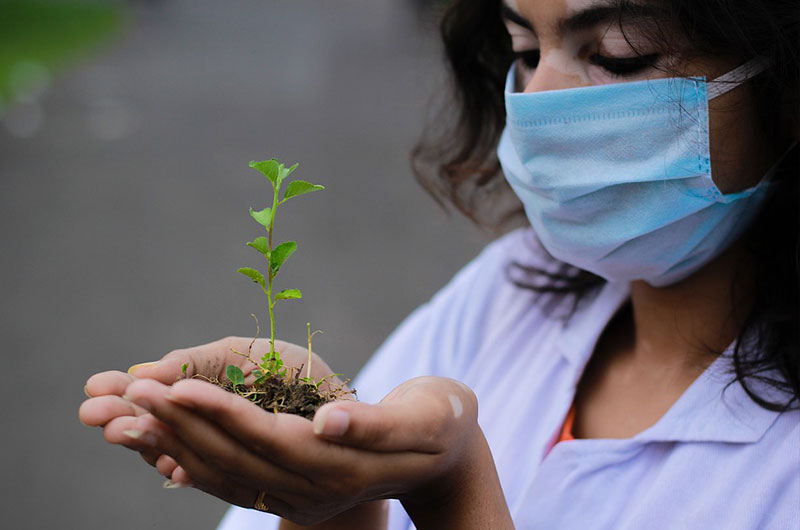 IIT Guwahati
IIT Guwahati IIT Guwahati develops coating to modify ordinary cloth masks for better protection against COVID-19
Guwahati: Indian Institute of Technology Guwahati researchers have developed a ‘Nanometer Thick Superhydrophobic Coating’ material to modify ordinary cloth or silk masks that will maintain its comfort but offer better protection against aerosol-driven infections such as COVID-19.
According to World Health Organisation (WHO) guidelines, N95 masks or double masking protects people to a great extent from Coronavirus. But the drawback is that people undergo suffocation after wearing them for a long time. Besides, N95 are costly and thus unaffordable to large sections of the population. Instead, people resort to cheaper and readily-available cloth and silk masks.
To address these challenges and to bring in a safer, economical and comfortable alternative the researchers of IIT Guwahati have developed a coating material to modify the easily-available cloth mask into a hydrophobic mask to repel virus-laden droplets and avoid breathing difficulties even when worn for a longer period of time. Another advantage is that these masks are versatile and can be used with other additives such as antibacterial nanomaterial for additional protection against viruses.
The research was led by Prof. Arun Chattopadhyay, Department of Chemistry and Centre for Nanotechnology, IIT Guwahati and Dr. Partho S. G. Pattader, Department of Chemical Engineering, School of Health Science and Technology, and Centre for Nanotechnology, IIT Guwahati. This work is recently published in the reputed peer-reviewed journal ACS Applied Bio Materials (https://pubs.acs.org/doi/full/10.1021/acsabm.1c00851).
Highlighting the unique aspects of this Research, Prof. Arun Chattopadhyay, Department of Chemistry and Centre for nanotechnology, IIT Guwahati, said, “A cloth mask is largely porous to aerosol and thus cannot effectively prevent COVID-19 type infection. Although they are still better than wearing no mask, an improved version that would prevent the entry or exit of the aerosol from the modified cloth mask was needed. We have worked on that based on the principle of repulsion of the aerosol by the modified cloth while allowing the air to flow through the mask. A simple coating of the hydrophobic molecule on the silk cloth worked well here.”
The breathability was tested by measuring the oxygen permeation through the mask with the help of an instrument called Gas Chromatography. The penetration of oxygen reduces by only 22% for the modified Eri silk mask compared to the natural Eri silk mask, whereas for N95 the reduction with respect to the natural Eri silk came out to be around 59%. Hence, the modified silk mask is way more breathable than the N95 mask but with almost similar protection against aerosol-driven infections.
Shedding light on the use of Eri silk, Prerona Gogoi, Student, Department of Chemical Engineering, IIT Guwahati, and the first author of the paper, said, “We have chosen Eri silk for carrying out this study. This silk comes from the caterpillar Samia ricini native to northeast India and some parts of China and Japan.”
“This is a one-step quick and inexpensive fabrication process that would help in the mass production and distribution of these masks to a large section of the population,” Gogoi added.
The sustainable, durable, and robust Eri silk, also referred to as the fabric of peace, is softer than many other silks or cotton and has the unique property of maintaining coolness in summer and providing warmth in winter.
Describing the functioning of the mask, Dr Partho S. G. Pattader, Department of Chemical Engineering, School of Health Science and Technology, and Centre for Nanotechnology, IIT Guwahati, said, “To attain hydrophobicity, Eri silk fabric was coated with a biocompatible nanometer-thick coating of a chemical called octadecyl trichlorosilane (OTS). OTS, being a fluorine-free chemical after bonding with the fabric, becomes non-hazardous to health and the environment. And the good part is the cloth/silk masks still remain comfortably breathable after the nan-coating.”
When any droplet hits the modified Eri silk mask, it bounces back into the air rather than being passed through the fabric or getting soaked by the fabric itself. Another added advantage is that these modified Eri silk masks can be reused again after subsequent washing with household detergent and drying.
(Reporting by Hemanta Kumar Nath)
Support Our Journalism
We cannot do without you.. your contribution supports unbiased journalism
IBNS is not driven by any ism- not wokeism, not racism, not skewed secularism, not hyper right-wing or left liberal ideals, nor by any hardline religious beliefs or hyper nationalism. We want to serve you good old objective news, as they are. We do not judge or preach. We let people decide for themselves. We only try to present factual and well-sourced news.







